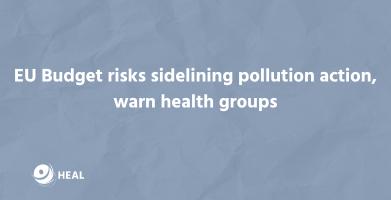In 2025, HEAL welcomed several new organisations into its international network of over 70 members committed to advancing health through environmental action. These new members bring valuable expertise in public health, environmental justice, and sustainable policy, further strengthening the capacity of the alliance to help face the challenges from biodiversity loss, pollution and climate change. Learn more about their missions and work below.
The EU’s proposed 2040 climate target to reduce domestic emissions by 90% – while allowing up to 3% to be met through international carbon credits – risks undermining health protections. The Health and Environment Alliance calls on member states to strengthen their climate commitments in order to protect health, rather than delay and weaken overdue action.
“Climate change is a public health emergency, the longer decisive EU climate action is postponed, the greater the health cost will be. The current heatwave is a stark reminder of these impacts and underscores that a continued commitment is needed to cut down climate-forcing emissions. Regrettably, today’s proposal by the EU Commission opens the door for climate laggards. We urge EU decision-makers to take an approach that protects health and stop wiggling their way out of necessary action. ” Claudio Lanza, Senior Policy and Advocacy Officer on Health and Climate at The Health and Environment Alliance (HEAL) states.
Allowing third country carbon offsets to meet the EU’s climate target undermines pollution-reduction and efforts to protect public in Europe. The majority of greenhouse gas emissions in the EU are the result of fossil fuel burning in transport, energy or industrial processes. In these combustion processes, together with CO2, high amounts of air pollutants are being released which worsen air quality locally and regionally, leading to significant health impacts and cost.
Domestic reductions are needed to ensure verifiable emission cuts. Additional flexibilities for member states to offset underperformance in one sector with overachievement in another risk becoming loopholes that delay real decarbonisation – particularly in key sectors that directly impact health, such as transport, agriculture, and housing.
The impacts of climate change on people’s health are mounting: the – summer of 2023 saw 47,000+ deaths from heat , which is the second highest number since 2015. Wildfire smoke worsens air quality, affecting vulnerable groups especially. One in three Europeans has allergies, now worsened by longer seasons. Fossil fuels drive climate change, pollution, and early deaths. Most Europeans also consider addressing climate change should be a priority to improve public health and quality of life, according to a recent Eurobarometer survey.
As hesitation on climate mitigation among EU member states seems to be growing, HEAL reminds member states of their commitments under the Paris Agreement to limiting global warming to 1.5°C above pre-industrial levels. In view of the health cost of inaction, HEAL considers that the EU should reach climate neutrality by 2040.



